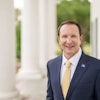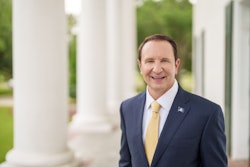Meridith Randall has deftly stabilized Golden West College (GWC) and moved it toward its future.
When Randall’s presidency was made permanent in January, she had been serving as interim president for nine months. Assuming the position when the previous president resigned, she knew everyone was looking to her to bring stability to the community college. To do so, she focused on long-standing issues like program development and student support services, and by the time the Coast Community College District Board of Trustees approved her permanent position, progress was tangible.
 Meridith Randall
Meridith Randall
“Seventy percent or so of our students get financial aid, and they, with our help, can succeed and go on and get productive careers,” says Randall, who has worked in California community colleges for about 25 years. “In California, we have great workforce needs across the board, and that’s a huge role for community colleges.”
Randall enjoys leading a relatively small college that focuses on student success, and she embraces the vision to serve local communities. “I like to run a very transparent college where everyone is always informed — not just faculty, but also our classified professionals,” she says. “I send out messages every week. I ask my vice presidents to do the same. That’s kept everyone calm, focused and believing we are all moving in the same direction.”
Jordan says people are pleased with Randall’s candor and the transparency in communication. “The sometimes tedious, but necessary, explanation of a thought process,” he notes.
GWC has seen a significant increase in success rates, particularly after awarding 326 basic needs small grants totaling $264,211 to students during the spring semester. The average grant was $810 per student, and those who received them had an 83% course success rate compared to 72% for the general student population. The impact was especially felt for Hispanic/Latinx students, with 81% of the recipients succeeding in their courses versus 64% in the comparison group. Grade-point averages were also higher for students who received the grants — 2.97 versus 2.49.
Under Randall’s presidency, personnel have been added to the college’s transfer office to serve those students desirous of transferring to a four-year institution. Data from fall 2023 shows that GWC’s transfer admittance rate for Hispanic students to schools in the California State University system is 92.6% and for the University of California system it is 79.5%.
GWC has invested in non-credit career and technical education courses as well as a non-credit health program. Also, the college’s nursing program is experiencing exciting growth.
“We were one of the first community colleges in the state that got approval from the Board of Registered Nursing to double our enrollment from 100 students a year in our ADN (Associate Degree in Nursing) program to 200,” says Randall. “This year we’re on track for about 150.
“We recently got a CalOptima grant for $1 million over five years to increase our nursing pathways from high school,” she continues. “We have a fantastic nursing director, associate dean Dr. Alice Martanegara, and she already has many connections with healthcare facilities. . . We have a vision over the next five to 10 years of putting in place some other allied health programs, such as surgical tech, and perhaps eventually have a new healthcare building on campus.”
Randall says faculty training in online teaching is a priority this year.
Last October, GWC opened its Language Arts Complex with 30 standard classrooms, 10 larger instructional spaces, a student resource center, and 36 full-time faculty member offices.
“All the things that matter to a community college and the students that attend it, she’s attending to in very loud and quick fashion,” Jordan says. “I know that [President Randall] sees the potential in all students, so she’s looking to expand our ability to serve all those students, which is part of the equity mission.”
One of Randall’s goals is to offer classes with zero-cost textbooks. “We’re about 40% there, but I would like all of our classes to have open-source (software) or free textbook materials, so we no longer have to ask students to buy those,” says Randall.


















